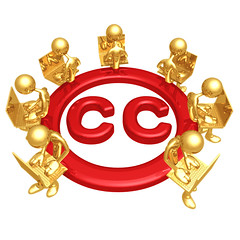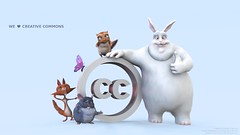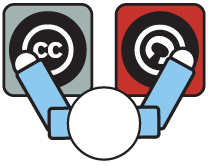
A post by John Owen
Creative Commons (CC) provides the legal framework for creators to offer some rights to others under certain conditions, replacing ‘all rights reserved’ with ‘some rights reserved’. These conditions cover attribution to the creator, whether or not the work can be changed in any way, whether it can be used for commercial gain, and what form of licence must apply to any future use of the work. The NZ CC website has a good description of the licence combinations.
Of all these options, the most controversial and misunderstood is the right to (or restriction of) commercial gain. That is to say, if you issue a creative work under the CC licence, should you let others use it to make money?
Search Flickr for CC images of your favourite subject and you will have a small subset of the overall content available under standard copyright protection. Restrict your search to a CC licence that allows for commercial use and you will have a fraction of the original content (if any, depending on your chosen subject).
Why is this the case? My suspicion is that the public understanding of CC licensing is misguided by the traditional copyright environment we are familiar with; that is to say, an environment that rewards ownership and stifles creativity. Put another way, we think that ownership rather than creative use endows us with the right to claim reward.

Image source - by lumaxart
The intention of CC is to create public goods (resources) for creative use by all, whilst at the same time allowing the creator to reserve certain rights. However, to be of future creative use to others it is essential not to apply too many restrictions. I would argue that, most importantly, we should not restrict the right for others to make money with these public goods. If someone can earn a living using my Pacific Island holiday sunset picture when I could not (or cared not to), should I expect much more than accreditation for a lucky snap?
To give a less trivial example, there are kiosks called Freedom Toasters that burn free and open source software (such as Firefox, Open Office, Ubuntu etc) as well as other social content onto disks for those who cannot download it from the Internet. The licences that these applications and content are distributed with do not prevent the kiosk maker or owner from charging for this service should they wish (the service is actually free). However, it would not be possible to distribute CC non-commercial content this way without agreement - in practice, it would be impossible. Licensing a relatively valueless creative work this way restricts the way it can be used to directly or indirectly benefit others.
The Freedom Toaster (Image source - by Breadbin Interactive)
I chose this (slightly convoluted) example because it touches on another important right, which is the human right to earn a living. Free and open source software supports this right, allowing others to earn a living from products licensed this way. And developers of free software feed themselves by offering support and customisation of free software. Free in this context is derived from libre rather than gratis; i.e. free speech as opposed to free beer, as Richard Stalmann (founder of the Free Software Foundation and author of many copyleft licences such as the GNU GPL) is often credited with saying. This is an organic and self sustaining model that not only works, but works very well. Overzealous protection of rights and ownership not only stifles creativity, but also denies many the right to earn a living; and instead allowing a small few to earn a fortune.
If you wish to support a truly creative environment from which we can all benefit then you should always consider allowing for commercial use. If you have no idea how to make money from your works, don’t stop someone else from doing so. The only restriction you should consider applying is one that ensures your licence cannot be changed in any future use.
What does this have to do with education? In New Zealand we are lucky enough to have the right to participate in primary and secondary education. If we were to make the course content free and open, then maybe some of the barriers to education will be vulnerable to the creativity of our educators - and educators around the world. Maybe it would help more parents become engaged in their children’s education. Could it also help teachers by presenting them with a far wider set of resources and teaching tools and opportunities to collaborate? Perhaps it would result in a more critical evaluation of the quality of our existing teaching materials.

Image source - by steren.giannini
Many institutions are heading down this path with high profile examples such as MIT placing almost all courses in the public domain (although, under a CC non-commercial licence). Here in NZ we are looking at creating some shared national teaching resources through projects such as Learn Guide Protect with NetSafe, and there are numerous examples of on-line teacher communities already sharing ideas such as OERNZ.
Educational resources should be free. There is no reason to own educational resources as they will simply become obsolete. Educational resources should be given to the community where they can be improved and modified far beyond the imagination of the original creator. The community should also not be denied commercial gain from this activity, as this simply stifles creativity for no reasonable benefit.
Consider this from a different, slightly geeky, angle. Do you prefer to use Firefox (free and open) or Internet Explorer (not free or open)? What if educational resources were produced by a community similar to the collaborative creators of Firefox? Resources that were created by a group of people spread across the world from diverse backgrounds and cultures. Imagine the depth and breadth of experience that would be available to educators here in New Zealand. Imagine how we could also reciprocate and help others.
Interesting links and attributions
- http://wikieducator.org/ and http://wikieducator.org/OERNZ/Sharing_Open_Education_Resources_-_Information_Sheet
- http://oerwiki.iiep-unesco.org/
- http://www.freedomtoaster.co.za/
- http://washlee.net/toaster/
- http://www.creativecommons.org.nz/
- http://creativecommons.org/education
- http://www.data.govt.nz/
- http://open.org.nz/
John Owen
For the past 15 years John has worked predominantly in IT within the telecommunications industry for solution providers and operators (mobile and fixed line). His career has taken him from a Siemens' R and D center, to product development and account management with solution vendors, and through the IT and Engineering departments of telecommunications operators. This journey has given him a thorough understanding of the technical and business requirements of technology led companies.John's current focus is to apply his knowledge to school and industry education, finding ways to blend technology with learning such that it enhances the experience and delivers real-world skills.
Related articles
- Creative Commons' Branding Confusion (techdirt.com)
- Lawrence Lessig Explains Creative Commons Licensing (freetech4teachers.com)
- What's Wrong With Creative Commons (downes.ca)
 On the shoulders of giants: Creative Commons and commercial use is licensed under a Creative Commons Attribution-ShareAlike 3.0 New Zealand License.
On the shoulders of giants: Creative Commons and commercial use is licensed under a Creative Commons Attribution-ShareAlike 3.0 New Zealand License.









No comments:
Post a Comment